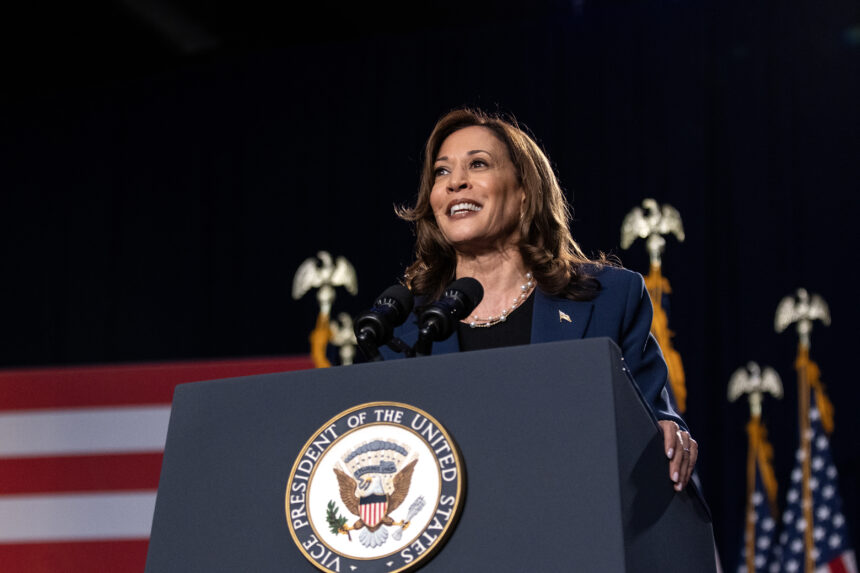Vice President Kamala Harris erased former President Donald Trump’s gains with union voters in most key states, according to a new poll.
Union voters could be a decisive group in the 2024 presidential election, as they are a key electoral bloc in several swing states. Union voters traditionally vote for Democrats, who have adopted more pro-worker policies but have shifted to Republicans in recent election cycles.
A recent Emerson College poll showed Harris with gains in Arizona, Michigan and Wisconsin, although Trump’s support has grown in Pennsylvania.
The poll comes as Harris appears to be the frontrunner to secure the Democratic presidential nomination after President Joe Biden ended his campaign over the weekend. The withdrawal follows weeks of pressure from prominent Democrats concerned about their ability to win elections in November amid poor poll numbers.
Harris’ poll numbers for months have been on par with, if not worse than, Biden. However, his supporters believe he will be better able to lead a strong campaign that can win over swing voters and build morale among Democrats.
Several polls released this week show him continuing to trail Trump but advancing on Biden.

Jim Vondruska/Getty Images
An Emerson College poll released on Thursday showed Trump continuing to lead in battleground states, although Harris’ numbers were generally better than Biden’s in a June swing state survey.
Trump holds a 5-point lead in Arizona (49 percent to 44 percent), a 2-point lead in Georgia (48 percent to 46 percent), a 1-point lead in Michigan (46 percent to 45 percent) and a 2- point lead in Pennsylvania (48 percent to 46 percent). Harris and Trump are tied in Wisconsin, each receiving 47 percent of the vote.
The poll marks a shift toward Harris compared to an Emerson College poll conducted in July. In the poll, Trump has an 8-point lead in Arizona (46 percent to 36 percent), a 5-point lead in Georgia (44 percent to 39 percent), a 3-point lead in Michigan (43 percent to 40 percent), a 6-point lead in in Pennsylvania (46 percent 5o 40 percent) and a 3-point lead in Wisconsin (46 percent to 43 percent).
Harris has made gains on union voters in several swing states, according to polls.
In Arizona, union voters were roughly split between Harris and Trump. Harris won the support of 43.8 percent, while 43.4 percent supported Trump. However, a June 20 poll found that Trump won him over Biden by 26 points (59 percent to 33 percent).
In Michigan, Harris won union voters by 24 points (59 percent to 35 percent). In June, Biden led by only 7 points among union voters (51 percent to 44 percent).
Meanwhile, in Wisconsin, Harris led Trump by a wider margin among union voters, largely due to an increase in undecided union voters. The poll found he has an 11-point lead (51 percent to 40 percent) among union voters. In June, Trump held a 7-point lead among union voters (53 percent to 46 percent).
Pennsylvania, however, delivered better news for Trump. He has a 4-point lead among union voters over Harris (50 percent to 46 percent), compared to Biden’s 4-point lead in June (50 percent to 45 percent).
In June, Trump held a 4-point lead in Arizona (46 percent to 42 percent), a 5-point lead in Georgia (47 percent to 42 percent), a 1-point lead in Michigan (45 percent to 44 percent), a 5-point lead in in Pennsylvania (48 percent to 43 percent) and a 3-point lead in Wisconsin (47 percent to 44 percent).
The latest poll was conducted from July 22 to July 23. The sample size was 800 respondents in Arizona, Georgia and Michigan, 850 in Pennsylvania and 845 in Wisconsin.
The previous July poll was conducted among 1,000 registered voters on June 15 and June 16, 2024. The June poll was conducted among 1,000 registered voters in each state from June 13 to June 18, 2024.
On Thursday, Harris is set to speak to the American Federation of Teachers, which has endorsed the campaign, according to the Associated Press. The AFL-CIO has also endorsed Harris’ campaign.
Uncommon knowledge
Newsweek is committed to challenging conventional wisdom and finding connections in the search for a common field.
Newsweek is committed to challenging conventional wisdom and finding connections in the search for a common field.




